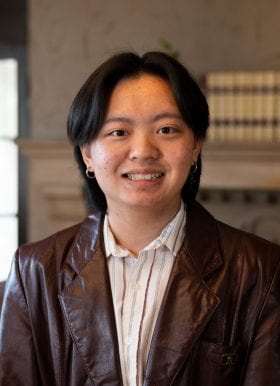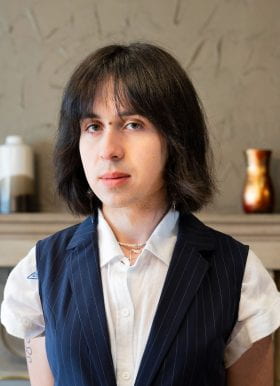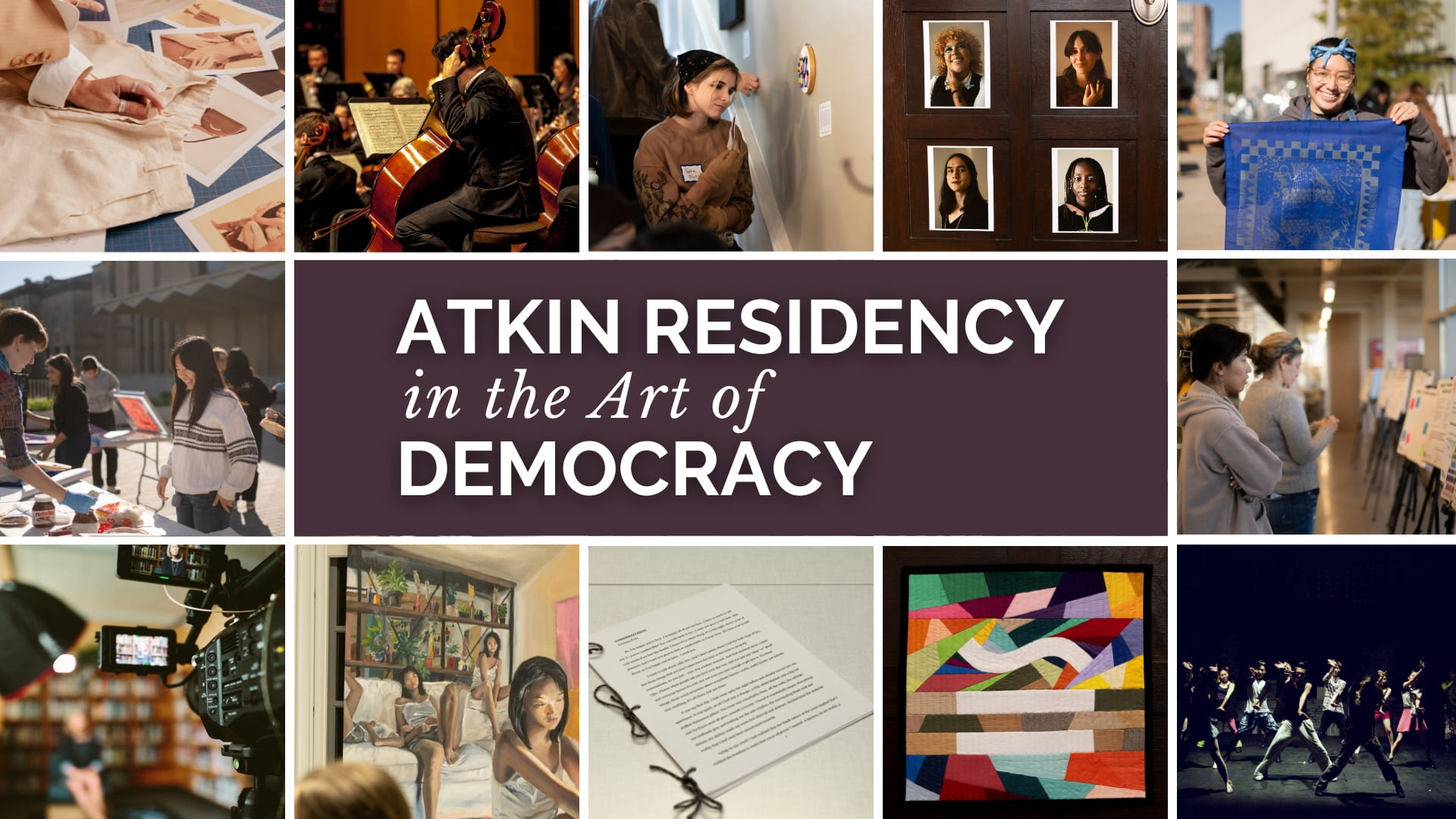
Visionaries, storytellers, disrupters—artists of all media have long imagined the future of our democracy.
Drawing on the rich tradition of the arts as a catalyst for social change, the Atkin Residency in the Art of Democracy supports undergraduate student artists to investigate the paradoxes, evolutions, histories, stories, and possibilities of U.S. democracy. Open to creators of all kinds, this competitive yearlong residency provides a platform for artists to deepen their practice, gain visibility, and foster public discourse. In 2024, the inaugural resident will be awarded a $10,000 stipend to offset living costs and to support learning and the production of work.
2024-2025 Atkin Residents
Applications for the 2024-2025 cycle are currently closed. Please check back in spring of 2025 for information on the next application cycle.
Atkin Residency in the Art of Democracy Application
We invite you to apply for the inaugural 2024 residency. Please see the program timeline below for more information.
The application is currently closed.
Submit a Student Recommendation
A recommendation is required from a WashU faculty or staff member who knows the applicant in an academic capacity.
The application is currently closed.
Submit a Mentor Letter of Support
A letter of support is required to be completed by someone with relevant expertise willing to serve as a mentor to the applicant.
The application is currently closed.
Residency Expectations
- Create significant work(s) that investigate the paradoxes, evolutions, histories, stories, and possibilities of U.S. democracy
- Work 10-15 hours per week on proposed project(s) over the course of an academic year (August 2024 – April 2025)
- Plan and implement a public-facing event and/or other vehicles for public engagement to share work and foster discourse at the end of the year
- Select a mentor and advisors to provide regular guidance and critique throughout the year
- Participate in weekly check-ins with mentor and monthly joint check-ins with mentor and Gephardt staff
- Identify and secure relevant resources including materials, studio space, event space, etc.
- Work is a large-scale independent project that may build on past academic or co-curricular work but extends beyond current assignments
- Per WashU guidelines, projects funded by this residency cannot explicitly support a particular political candidate or ballot initiative or be used in any way that could appear to suggest University endorsement or support for a political candidate, political party, or political action committee.
- Residents may opt to participate in a funded trip to visit the Norman Rockwell Museum in Stockbridge, MA
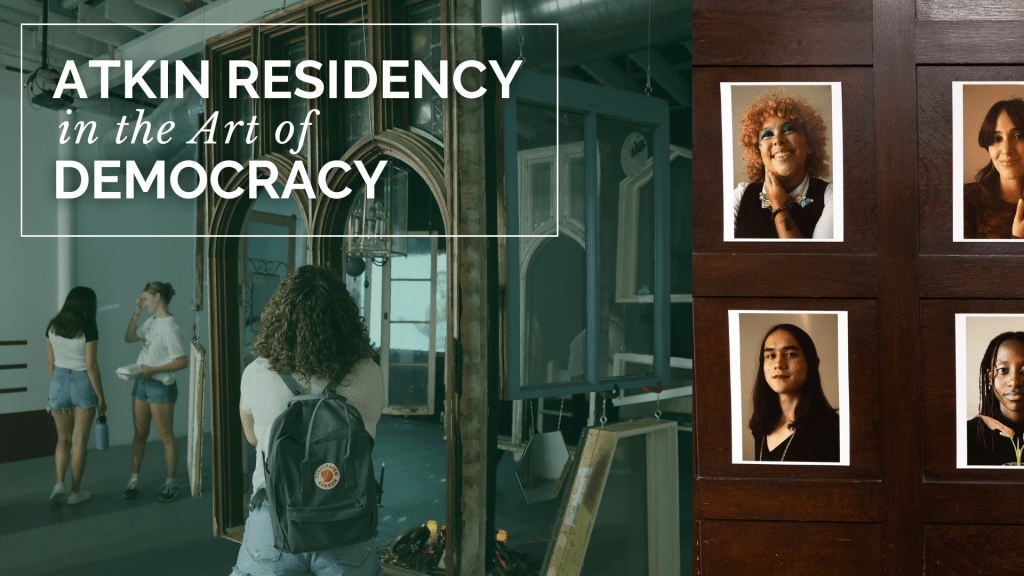
Program Timeline
Application: The 2024 application period will open on Thursday, February 8, 2024, and close on Thursday, March 7, 2024, at 9 p.m. CT. Start your application here!
Interviews: Finalists will be interviewed by a selection committee in March 2024 and decisions will be made by April 2024.
Spring 2024: Selected resident will meet with Gephardt staff and mentor to develop workplan for residency.
Fall 2024: The residency begins August 2024. Resident will work 10-15 hours per week on the proposed project and complete weekly check-ins with mentor and monthly joint check-ins with mentor and Gephardt staff. The fall semester will culminate with a formal critique/progress check in.
Spring 2025: Resident will work 10-15 hours per week on the proposed project and complete weekly check-ins with mentor and monthly check-ins with Gephardt staff. Resident will plan and implement a public-facing event and/or other vehicles for public engagement to share work and foster discourse at the end of the year. The residency will conclude in April 2025.
Frequently Asked Questions
All types of artistic media are eligible, including, but not limited to: architecture, dance, drawing, digital media, fashion, film, music, painting, photography, poetry, printmaking, sculpture, theatre, writing, and culinary arts. If you are uncertain of your eligibility, please reach out to Student Engagement Specialist, Sophie Devincenti.
Please note, you do not need to have an arts-related major or minor in order to apply. We welcome students from all academic disciplines to apply.
The Gephardt Institute defines democracy as a system of governing a polity (political unit) through which members of the polity play a key role in public decision making, either indirectly, through electoral processes, or directly. There are many different ways democracy functions and has functioned across locations, cultures, and time.
Projects should focus on U.S. democracy and are welcome to also incorporate global perspectives on democracy.
Due to WashU’s nonprofit status, “University services, resources, or funds may not be used in any way that could appear to suggest University endorsement or support for a political candidate, political party, or political action committee.” (Learn more here). Though work funded by the Atkin Residency cannot explicitly endorse particular candidates, parties, PACs, or ballot initiatives, many democracy-related questions can be explored without doing so. If you are considering applying and would like to discuss whether your project would align with this requirement, please reach out to Student Engagement Specialist, Sophie Devincenti.
You should have an idea of what you’d like to produce. However, we understand that projects may evolve over the course of the residency. It’s okay if your final project does not perfectly match what you propose in your application.
Please upload a portfolio of your work here. Your portfolio should include 3-5 recent works that demonstrate your artistic vision and offer clear examples of the kind of work you might complete during the residency. Please submit a PDF slide deck of 3-5 slides (one artistic work per slide) with short descriptions of the work (80-100 words with title, media, dimensions, date completed, contextual info, and artistic intent) and a web link to the work, if applicable (e.g. audio, writing samples, video). The content on the slides can vary based on media.
- For architecture, drawing, fashion, painting, photography, printmaking, sculpture, culinary arts: PDF slides with 3-5 recent works, high quality images
- For dance, digital media, film, theatre: PDF slides with 3-5 recent works, links with up to 15 minutes of video
- For music: PDF slides with 3-5 recent works, links with up to 15 minutes of audio
- For writing: PDF slides with 3-5 recent works, links with up to 10 pages of writing
Please be sure that any files you link from cloud storage are set to publicly shared or accessible via link.
All fulltime undergraduate students who will be enrolled for the entirety of the 2024-2025 academic year are eligible to apply.
Students studying abroad in Spring 2024 are eligible to apply and complete the residency in the 2024-2025 academic year. Students planning to study abroad during the Fall 2024 and/or Spring 2025 semesters are not eligible for the residency.
- Earnings in lieu of paid work
- Living costs
- Artistic supplies
- Project supplies and equipment
- Securing studio space or renting venues
- Event expenses
- Honoraria for performers and collaborators
- Additional honoraria for mentor
Salary payment to other individuals or re-granting of funds: While payment for services and honoraria for collaborators is allowed, we are not able to support direct salary payments, hiring of individuals, or re-granting of funds.
Campaign Work, Partnerships with Political Candidates, and Lobbying: Washington University is non-partisan, tax-exempt institution, and we are unable to fund any campaign work, partnerships with political candidates, and/or lobbying to influence legislation.
Purchases and activities that violate University policy and/or local, state, or federal law.
Recommendations are required as part of the application process. Your recommender should be someone who knows you in an academic capacity such as a WashU professor or WashU academic advisor. Recommendations are completed by filling out a quick form. You can only include one recommendation as a part of your application.
The Atkin Resident is expected to meet weekly with a mentor who can provide guidance on their project. The resident is expected to co-develop a meeting and deliverable schedule with their mentor, and the mentor can expect to spend 4-5 hours per month meeting with the student from August 2024 through April 2025.
Ideally, the mentor should be a subject area expert in the media the resident aims to pursue through their project. The mentor can be a WashU staff or faculty member or a St. Louis community member. Mentors will be compensated an honorarium of $500 per semester ($1,000 for the academic year) for their time and effort.
As a part of your application, we require a Letter of Support from your chosen mentor speaking to their ability and willingness to serve as your mentor.
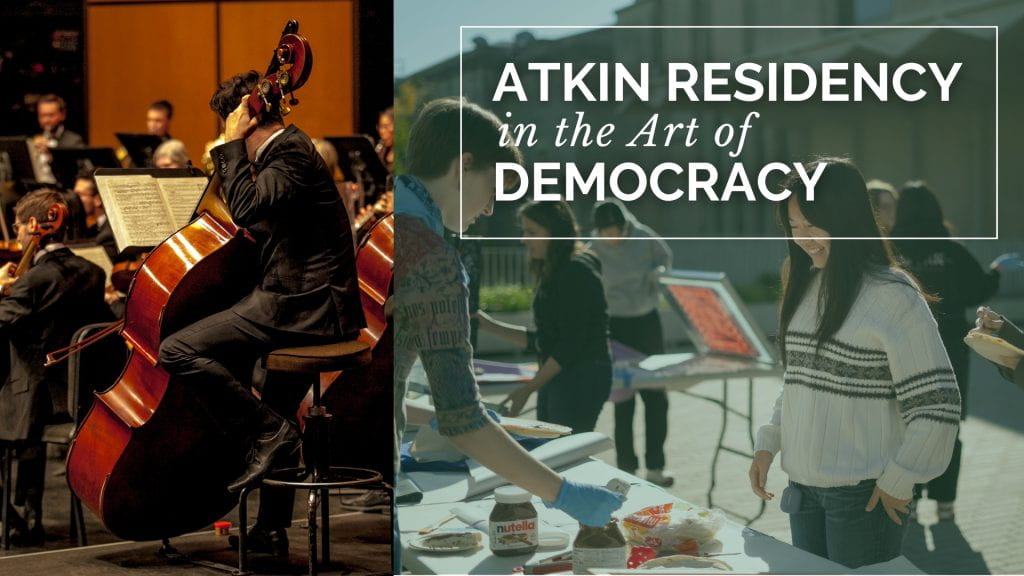
Information Sessions and Drop-In Hours
We encourage interested students to attend one or more of the following information sessions or drop-in hours. These sessions provide an opportunity to learn more about the residency, preview the application process, ask questions, and connect with Gephardt staff.
Information sessions and drop-in hours will be made available in-person and virtually. If you are not able to attend, please contact us with any questions.
The information session is an ideal opportunity to learn more about the Atkin Residency in the Art of Democracy. More details can be found on our events calendar.
Date and Time: Friday Feb. 16, Noon – 1 p.m. at Stix House
Missed the session? Slides from the info session can be found here!
In-person drop-in hours are available for applicants to learn more about the Atkin Residency. Gephardt Staff will be available to answer questions about the program. More details can be found on our events calendar.
Dates and Times:
Tuesday, Feb. 20, 10 a.m. – Noon at Stix House
Thursday, Feb. 22, 4 p.m. – 5 p.m. at Stix House
Friday, March 1, 2 p.m. – 4 p.m. at Stix House
Application Tips
- Share don’t compare – We all have unique lived experiences and opportunities, don’t focus on how you will compare to other applicants. Instead, focus on sharing authentically about your own experiences and outlooks.
- Keep it concise – Essay questions have a 300 word limit, which isn’t a lot! Be sure to use that space to answer the question posed, which might require a more succinct answer than you’d like to provide – with less background information.
- Reflect, reflect, reflect – You are the expert on you! Take a bit of time to reflect deeply on how to best share your story and put your best foot forward in the application. Taking time to slow down — journal, doodle, or move around before writing — might prompt new and innovative ways to frame your application.
- Check in with recommender and mentor early – Be thoughtful about who you could ask to be a recommender and mentor for your application. Be sure to ask them early to ensure they have ample time to submit their forms.
- Use the downloadable PDF – Download the PDF of the application questions and draft your responses before submitting them through the official form. That way, if you lose your internet connection or get interrupted, you won’t lose your precious responses! It can be found linked on the application page.
- Don’t wait until the last minute – Applications are due on Thursday, March 7, at 9 p.m., but you can submit your application anytime between now and then! Waiting until the last minute can add unnecessary stress.
CAMPUS RESOURCES
In addition to information sessions and drop-in hours, applicants are encouraged to take advantage of WashU resources to support your application. The following offices offer one-on-one appointments, available to all WashU students:
| Resume, Interview, and Portfolio Support | Essay Writing |
| The Career Center DUC 110 https://careercenter.wustl.edu | The Writing Center Mallinckrodt Center, Lower Level https://writingcenter.wustl.edu |
For questions about the Atkin Residency or the application process, please contact Sophie Devincenti, Student Engagement Specialist, at sdevincenti@wustl.edu
